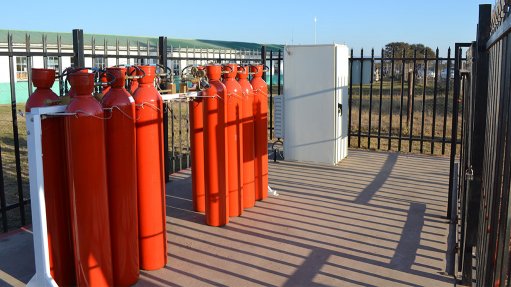
HYDROGEN FUEL CELL SYSTEM
Each of the twelve cylinders can provide 10 kWh of backup power
Photo by: Schalk Burger
The South African Department of Science and Technology (DST), in partnership with JSE-listed miner Anglo American Platinum and gas products company Air Products, has rolled out three 5 kW hydrogen fuel cell systems to provide backup power for three schools in the Cofimvaba area of the country’s Eastern Cape.
Science and Technology Minister Naledi Pandor unveiled the systems at the Mvuso Junior Secondary School, the Mfebe Senior Secondary School and St Marks Junior Secondary School, noting that they formed part of the department’s drive to apply technological solutions to resolve the energy, sanitation, health and nutrition problems encountered by these schools.
The fuel cells provide power for lights, staff computers and tablet devices being used by the schools as part of the Technology for Rural Education Development initiative, and the hydrogen gas cylinders are refilled once a month.
Two banks of six cylinders each fuel the fuel cell and Air Products engineering manager Phillip Venn notes that each cylinder can provide two hours of power.
Air Products uses remote monitoring systems to monitor the amount of gas remaining in the cylinders. The company supplies gas either from Port Elizabeth, a six-hour drive away, or Gauteng, a ten-hour drive away, and, thus, knowing when to send trucks to fill up all the cylinders at the schools is important, says Air Products business development manager Andre Grzesiak.
The system is a backup electricity system and is not linked to renewable-energy generation yet.
However, DST director-general Dr Phil Mjwara states that the department aims to link such systems to distributed renewable or alternative energy generation systems in future, and this pilot will help the department to assess the effectiveness of fuel cell technology to provide off-grid power.
The platinum-based fuel cells have been operating on site for 18 months and the system uses an energy management system at each school to provide power only to certain plug points based on their power consumption pattern, which enables the system to determine which device is plugged in. For example, teachers will not be able to use a kettle during power outages, but children can charge their tablets, which is the priority application, and teachers can use their com- puters, if there is sufficient power available, says Grzesiak.
“The schools do not usually use 5 kW, which can be generated by the system during outages and this reduces the logistical support requirements, as they consume little hydrogen gas, while improving the effectiveness of the backup power systems to support education,” he says.
Anglo American Platinum supplied the three fuel cell systems, Air Products supplies the hydrogen gas and Clean Energy Investments, which is a joint venture between the DST and Anglo American Platinum, implemented the project.
“Anglo American Platinum and Clean Energy Investments will be responsible for the maintenance and operating costs for a period of three years. “This period started from the date when the systems became operational in September last year. After three years, these fuel cell systems will be donated to the DST, which will then hand [them] over to the Eastern Cape Department of Education. “Local technicians are being trained in partnership with Clean Energy Investments to take over maintenance after the three-year period,” says Pandor.